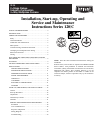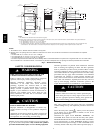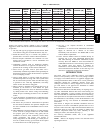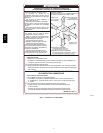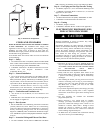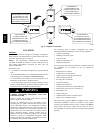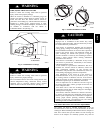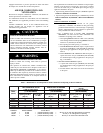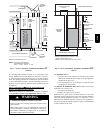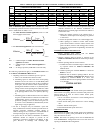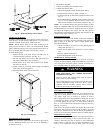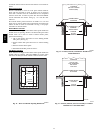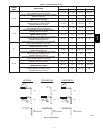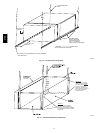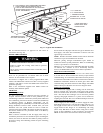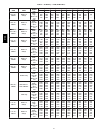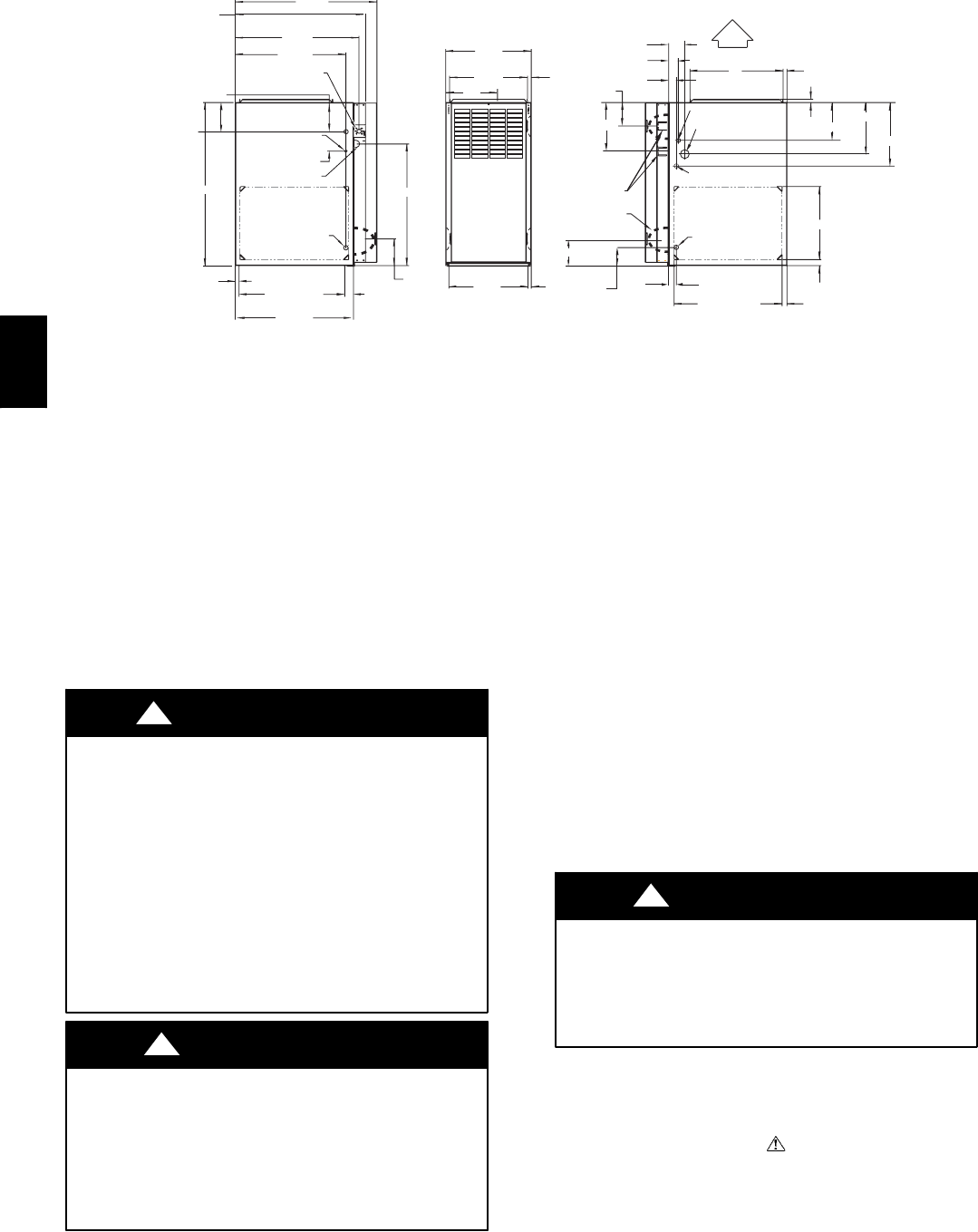
2
2-7/16"
1-1/8"
28-7/8"
25-1/4"
22-9/16"
JUNCTION BOX
LOCATION
7/8" DIA
ACCESSORY
1/2" DIA THERMOSTAT
WIRE ENTRY
3-15/16"
LEFT HAND GAS
ENTRY
33-5/16"
24-7/8"
5-1/2"
7/8" DIA. ACCESSORY
11/16"
21-5/8"
BOTTOM INLET
1-11/16"
13/16"
11/16"
4-13/16"
AIRFLOW
19"
OUTLET
13/16"
11/16"
8-9/16"
VENT OUTLET
5 PLACES (TYP)
3-3/4"
1-3/4" DIA.RIGHT HAND
GAS ENTRY
7/8" DIA. K.O. WIRE ENTRY
SIDE INLET
14-7/8"
7/8" DIA. ACCESSORY
1-1/4"
1"
22-1/16"
A
D
F
E
(FLUE COLLAR)
5-15/16"
24"
CASING
1-5/16"
1/2" DIA. K.O.THERMOSTAT
WIRE ENTRY
ALTERNATE
JUNCTION BOX
LOCATIONS (TYP)
26-1/8"
1-1/2"
7-3/4"
9-5/8"
11-1/2"
5-1/2"
NOTES:
1. Two additional 7/8-in. diameter holes are located in the top plate.
2. Minimum return-air openings at furnace, based on metal duct. If flex duct is used, see flex duct manufacturer’s recommendations for equivalent diameters.
a. For 800 CFM-16-in. round or 14 1/2 x 12-in. rectangle.
b. For 1200 CFM-20-in. round or 14 1/2 x 19 1/2-in. rectangle.
c. For 1600 CFM-22-in. round or 14 1/2 x 22-in. rectangle.
d. For airflow requirements above 1800 CFM, see Air Delivery table in Product Data literature for specific use of single side inlets. The use of both side inlets
a combination of 1 side and the bottom, or the bottom only will ensure adequate return air openings for airflow requirements above 1800 CFM.
A04037
NOTES:
1. Two additional 7/8---in. diameter holes are located in the top plate.
2. Minimum return--- air openings at furnace, based on metal duct. If flex duct is used, see flex duct manufacturer’s recommendations for equivalent
diameters.
a. For 800 CFM---16---in. round or 14 1/2 x 12---in. rectangle.
b. For 1200 CFM---20---in. round or 14 1/2 x 19 1/2---in. rectangle.
c. For 1600 CFM---22---in. round or 14 1/2 x 22---in. rectangle.
d. For airflow requirements above 1800 CFM, see Air Delivery table in Product Data literature f or specific use of single side inlets. The use of both sidein-
lets, a combination of 1 side and the bottom, or the bottom only will en sure adequate return air openings for airflow requirements above 1800 CFM.
Fig. 1 -- Dimensional Drawing
SAFETY CONSIDERATIONS
FIRE, EXPLOSION, ELECTRICAL SHOCK, AND
CARBON MONOXIDE POISONING HAZARD
Failure to follow this warning could result in dangerous
operation, serious injury, death, or property damage.
Improper installation, adjustment, alteration, service,
maintenance, or use could cause carbon monoxide
poisoning, explosion, fire, electrical shock, or other
conditions which may cause personal injury or property
damage. Consult a qualified service agency, local gas
supplier, or your distributor or branch for information or
assistance. The qualified service agency must use only
factory--authorized and listed kits or accessories when
modifying this product.
!
WARNING
FURNACE RELIABILITY HAZARD
Improper installation or misapplication of furnace may
require excessive servicing or cause premature component
failure.
Application of this furnace should be indoors with special
attention given to vent sizing and material, gas input rate,
air temperature rise, unit leveling, and unit sizing.
CAUTION
!
Installing and servicing heating equipment can be hazardous due
to gas and electrical components. Only trained and qualified
personnel should install, repair, or service heating equipment.
Untrained personnel can perform basic maintenance functions
such as cleaning and replacing air filters. All other operations
must be performed by trained service personnel. When working
on heating equipment, observe precautions in literature, on tags,
and on labels attached to or shipped with furnace and other safety
precautions that may apply. These instructions cover minimum
requirements and conform to existing national standards and
safety codes. In some instances, these instructions exceed certain
local codes and ordinances, especially those that may not have
kept up with changing residential construction practices. We
require these instructions as a minimum for a safe installation.
CUT HAZARD
Failure to follow this caution may result in personal injury.
Sheet metal parts may have sharp edges or burrs. Use care
and wear appropriate protective clothing, safety glasses and
gloves when handling parts and servicing furnaces.
CAUTION
!
Wear safety glasses and work gloves. Have fire extinguisher
available during start--up and adjustment procedures and service
calls.
This is the safety--alert symbol
. When you see this symbol
on the furnace and in instructions or manuals, be alert to the
potential for personal injury.
Understand the signal words DANGER, WARNING, and
CAUTION. These words are used with the safety--alert symbol.
DANGER identifies the most serious hazards which will result in
severe personal injury or death. WARNING signifies a hazard
which could result in personal injury or death. CAUTION is used
to identify hazards which may result in minor personal injury or
312A



